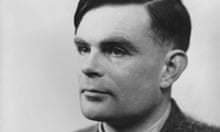Skip to main contentSkip to navigationSkip to navigation
Print subscriptions
Sign in
Search jobs
Search
●International edition
●UK edition
●US edition
●Australia edition
●Europe edition
The Guardian - Back to homeThe Guardian
●News
●Opinion
●Sport
●Culture
●Lifestyle
●
●
●
●
●
●
●
●
●
●
●
●
●
●
●
●
●
●
●
●
●
●
●
●
●
●
●
●
●
●
●
●
●
●
●
●
●
●
●
●
●
●
●
●
●
●
●
●
●
●
●
●
●
●
●
●
●
●
●
●
●
●
●
●
●
●
●
●
●
●
●
●
●
●
●
●
●
●
●
●
●
●
●Books
●Music
●TV & radio
●Art & design
●Film
●Games
●Classical
●Stage

In 2009, Gordon Brown issued an unequivocal apology to Alan Turing (above), saying the country owed him a huge debt.
In 2009, Gordon Brown issued an unequivocal apology to Alan Turing (above), saying the country owed him a huge debt.
Stamps
This article is more than 12 years old
Codebreaker Alan Turing gets stamp of approval
This article is more than 12 years old
Gay mathematician convicted of gross indecency in 1952 among those to be celebrated in Royal Mail stamps in 2012
Caroline Davies
Mon 2 Jan 2012 00.01 GMT
Share
The mathematician and second world war codebreaker Alan Turing is to be celebrated on a special stamp as an online petition calls for a posthumous pardon to quash his conviction for gross indecency.
The computer pioneer is one of 10 prominent people chosen for the Royal Mail's Britons of Distinction stamps, to be launched in February, which includes the allied war heroine Odette Hallowes of the Special Operations Executive, composer Frederick Delius and architect Sir Basil Spence, to mark the golden jubilee of Coventry Cathedral.
Turing worked as part of the team that cracked the Enigma code at Bletchley Park, and went on to help create the world's first modern computer. This year marks the centenary of his birth.
He was convicted of gross indecency in 1952, when homosexual acts were illegal in the UK, and sentenced to chemical castration. He killed himself two years later by taking cyanide. The e-petition says his treatment and death "remains a shame on the UK government and UK history".
In 2009, the then prime minister Gordon Brown issued an unequivocal apology on behalf of the government to Turing, describing his treatment as "horrifying" and "utterly unfair". Brown said the country owed him a huge debt.
Hallowes, who was born in Amiens, France, in April 1912 and married an Englishman in 1931, was awarded the George Cross (the only woman to receive the honour while alive) and the Légion d'honneur for her work in Nazi occupied France.
She was imprisoned, tortured and condemned to death in 1943 after being betrayed, but survived Ravensbrück concentration camp and the war. She died in 1995 in Walton-on-Thames, Surrey.
The Olympic Games and the Queen's diamond jubilee also feature in the 2012 special stamp programme.
House of Windsor stamps will feature the five monarchs from the start of the 20th century, with the Queen taking pride of place on the final stamp to mark the 60th year of her reign. A special miniature sheet issued on 6 February will bring together six portraits of her taken from stamps, coinage and banknotes.
Giant peaches and a famous chocolate factory will feature in a set of six stamps on 10 January to celebrate the work of Roald Dahl.
The first of several stamp issues to mark the London Games go on sale on 5 January. Other stamp subjects during the year include Charles Dickens, born 200 years ago this year, great British fashion, comics, dinosaurs, space science and classic locomotives of Scotland.
Explore more on these topics
●Stamps
●Design
●Alan Turing
●Royal Mail
●news
Share
Reuse this content
More on this story
More on this story

Government rejects a pardon for computer genius Alan Turing
…
…
comments

Alan Turing: My Favourite Scientist
…
…
comments
In praise of … pardoning Alan Turing
…
…
comments
Most viewed
Most viewed
●Books
●Music
●TV & radio
●Art & design
●Film
●Games
●Classical
●Stage
●News
●Opinion
●Sport
●Culture
●Lifestyle
Original reporting and incisive analysis, direct from the Guardian every morning
Sign up for our email
●Help
●Complaints & corrections
●SecureDrop
●Work for us
●
●Privacy policy
●Cookie policy
●Terms & conditions
●Contact us
●All topics
●All writers
●Digital newspaper archive
●Facebook
●YouTube
●Instagram
●LinkedIn
●X
●Newsletters
●Advertise with us
●Search UK jobs
Back to top
© 2024 Guardian News & Media Limited or its affiliated companies. All rights reserved. (dcr)



